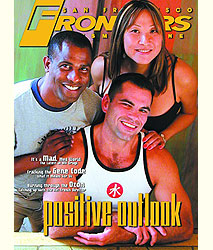Off the shelf
by Chris Culwell
Alternate Channels
Media studies on lesbians and gays have become something of a cottage industry these days. The problem with these books is that most of them draw on the same sources and in being cut from the same cloth make the same mistake of losing perspective in a blizzard of minutiae about who fired whom and who was the first out gay person to play an out gay character.
Steven Capsuto’s book strikes a fine balance between too much and too little information, but more importantly his point of view never strays from the subject at hand, the struggle of LGBT persons to find humane portrayals of themselves on TV and in movies.
Capsuto has done his homework. His book is comprehensive, beginning as far back as the 1930s and ending in the present, with a look at the gay characters on “Will & Grace.” But what makes the book terrific isn’t Capsuto’s handling of familiar material but his detailed accounts of little-known campaigns against queer defamation. While lavender types are likely to remember protests against “Midnight Caller” in the late ’80s, chances are fewer folks remember the lesbians who waged a demonstration in the offices of the producers of “Police Woman” over an episode about dykes who kill and rob old women; or Mark Segal, who interrupted tapings of “The Mike Douglas Show” to protest the show’s anti-gay slurs? Did you know that San Francisco’s own KGO-TV was picketed in 1967 for firing an openly gay man?
Capsuto’s book reveals the continuity of queer media activism over several decades and in doing so demonstrates that the struggle for realistic representation didn’t begin yesterday.
Alternate Channels: The Uncensored Story of Gay and Lesbian Images on Radio and Television from Ballantine for $18.
